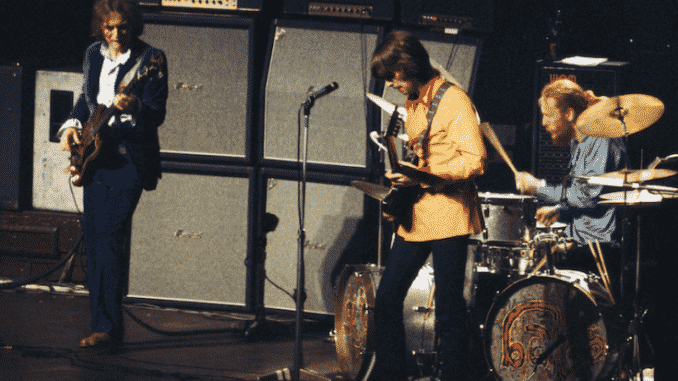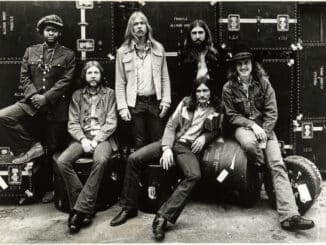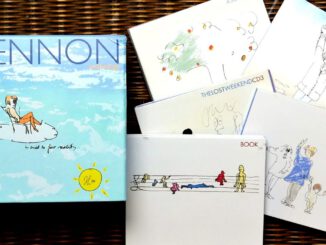
When just two-years of its inception, Cream—thanks to such signature songs as “Sunshine of Your Love” and the landmark double album “Wheels of Fire”—was able to boast a dedicated international following.In the U.S., Eric Clapton, Jack Bruce and Ginger Baker became one of the first “psychedelic” rock acts capable of filling arenas such as Madison Square Garden and Detroit’s Cobo Hall. Yet, despite their tremendous commercial success, the group perpetually teetered on the edge of self-destruction, thanks to internal tension that made the strife in Northern Ireland seem tame by comparison.
“There were problems very early on,” says drummer Ginger Baker. “The only thing that held the band together was its success.”
Cream enjoyed a reputation for superlative musicianship that was largely a product of the band’s high-velocity, freewheeling live performances. Regrettably, the relentless grind of touring ultimately wore away the fragile fabric which had held the trio together since their inception. The strain, Baker explains, finally pulled them apart. “On the last [1968] U.S. tour, after a gig in Texas, Eric [Clapton] came to me and said, ‘I’ve had enough,’ and I said, ‘So have I.’ And that was it. We decided, for different reasons, that it was all over.”
With their management and record company equally aghast at their decision to disband just as they’d achieved widespread commercial success, the group reconvened and agreed to record Goodbye, a farewell album.
While Clapton agreed to the concept of a final album, it soon became apparent that neither Baker, bassist Jack Bruce nor Clapton had the will or stamina to get things together enough to record a new studio disc. Ultimately, to save the project, each member agreed to contribute one new original song. The balance of the album would be filled with live recordings.
The group met with producer Felix Pappalardi at London’s IBC Studios in October 1968. All three of the soon-to-be ex-Cream members rose to the occasion and presented first-rate songs to meet their Goodbye quota. Jack Bruce’s contribution, which he co-wrote with lyricist Pete Brown, his frequent collaborator, was the rollicking “Doing That Scrapyard Thing.”
“Jack phoned me up in the middle of the night and said that they were in the studio, working on a song,” recalls Brown. “I asked what the song was about and he told me that it was autobiographical. He played me the backing track over the phone. I was living with Dick Heckstall-Smith at the time, and he had a very old Grundig tape recorder. The machine was more for dictation that it was for music, but we were able to make a faint recording over the telephone. As I played it back, I wrote most of the words around the few that Jack already had, and then I phoned them back to Jack. We made some small adjustments during the call, but that was ‘Doing Your Scrapyard Thing.’”
When the songwriting team of Bruce and Brown had outpaced Clapton on all three of Cream’s previous albums, the guitarist came up big on his original GoodBye tune. Partnered with George Harrison, he produced “Badge,” which stands as one of the group’s finest achievements.
“There was Felix on piano, Jack, Ginger and Me,” Harrison would later recall. “I played the rhythm guitar right up to the bridge, at which point Eric came in on his guitar with the Leslie [rotating speaker]. Eric overdubbed the solo later.” Harrison reveals that, in a sense, it was actually the bridge which inspired the song’s rather obscure title. “I was writing the words down, and when he came to the middle bit I had written ‘Bridge.’ And from where he was sitting, opposite of me, he looked and said, ‘What’s that—Badge?’ So he called the song ‘Badge’ because it made him laugh.”
Ginger Baker’s insistent “What a Bringdown” appropriately closed the album, signaling an end to the group’s creative partnership. The balance of Goodbye was drawn from live recordings made at Los Angeles Forum in October 1968.
The album’s first side presented spirited live renditions of Howlin’ Wolf’s “Sitting’ on Top of the World,” “Politician” and country bluesman Skip James’ “I’m So Glad.” None of the group’s members, however, played a role in the selection or mixing of the live material, ultimately leaving the task solely in the bands of Felix Pappalardi.
“When Cream died, it died,” says Baker. “Short of murder, we couldn’t solve a problem between us.”
Since then, Cream had some re-union shows. In 1993, Cream was inducted into the Rock and Roll Hall of Fame.





They were the greatest. Pure Rock Royalty.